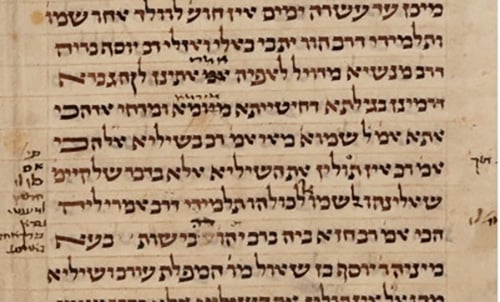A well-known Talmudic passage (TB Megillah 10b) describes the scene in heaven as the Jews miraculously crossed through the sea. The angels wished to sing their own song of praise to God for the miracle of the Jewish People’s salvation, but God objected: “My handiwork—the Egyptians—are drowning in the sea and you are singing?!” So, the angels did not sing, “v’lo karav zeh el zeh kol halaylah —one could not come near the other all through the night.”
Yet, we, the Jewish people sang, and our song was precious, divinely inspired and immortalized, such that we repeat it every single day in its entirety and invoke its central lines before we pray the Amidah each morning and night. What is the difference? Why could people sing when the angels could not?
Rav Shimon Schwab offered a meaningful explanation. This was a moment that involved both celebration and grief, a complexity the Jewish People would need to learn to live with and even embrace. We would sing over our salvation even as we remained aware of the sadness of the concurrent loss on the enemy side. Angels, on the other hand, are not built for complexity. Each angel has one exclusive mission (Bereishit Rabba 50:2) and is incapable of either practical or emotional multitasking. Unlike us, the angels could not sing and cry simultaneously, rejoicing for our salvation while crying over the loss of God’s creations.
That is one approach to the question, and it carries particular resonance during these confusing times where we have become accustomed to the incredible joy of seeing our hostages freed, mixed with the fear and anger of watching Hamas and many Palestinians celebrate the return of their murderous and unrepentant terrorists. We have become accustomed to the complexity of laughing and crying simultaneously.
We can also consider another approach to the question. The angels were not a party to the conflict playing out at the sea. From their perch in heaven, they observed objectively what was unfolding in the world below. They saw the Jews emerge from the sea and the Egyptians drown, and their joy for the one side was offset by the tragedy on the other. The Jews, on the other hand, made no claim on objectivity. We had been enslaved and afflicted by the Egyptians and now we were free, and so,of course,we would sing and express our personal and national gratitude. We had to be joyous as there is no virtue in aspiring for objectivity that detaches us from our own experience and our personal and subjective feelings.
One of the core issues debated in the modern State of Israel is the tension between its Jewish and democratic values. In truth, even our Jewish value of Darkei Shalom (promoting good relations among people) guides us to be hospitable, respectful, charitable and compassionate towards every human being in need, Jew and non-Jew. But universal respect and compassion do not supplant personal and national commitment and must not reduce our allegiance to each other, to prioritizing our care for our fellow Jews and our commitment to build Jewish life.
Angels are objective, but people live and celebrate their relationships. We must be universally kind and caring but exceptionally committed to each other and to the Jewish future.
Rabbi Moshe Hauer is executive vice president of the Orthodox Union (OU), the nation’s largest Orthodox Jewish umbrella organization









